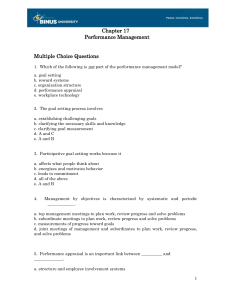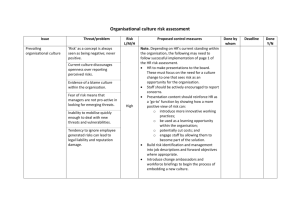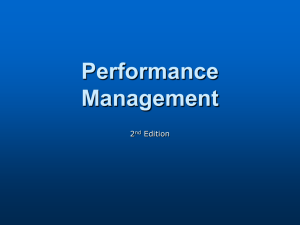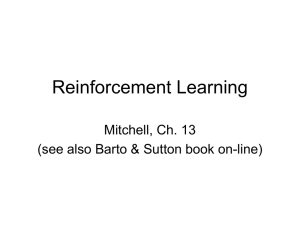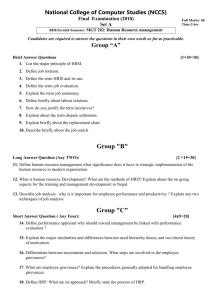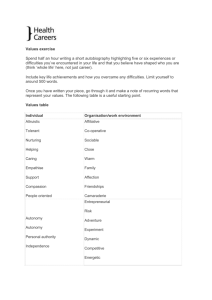Study Unit 4
advertisement
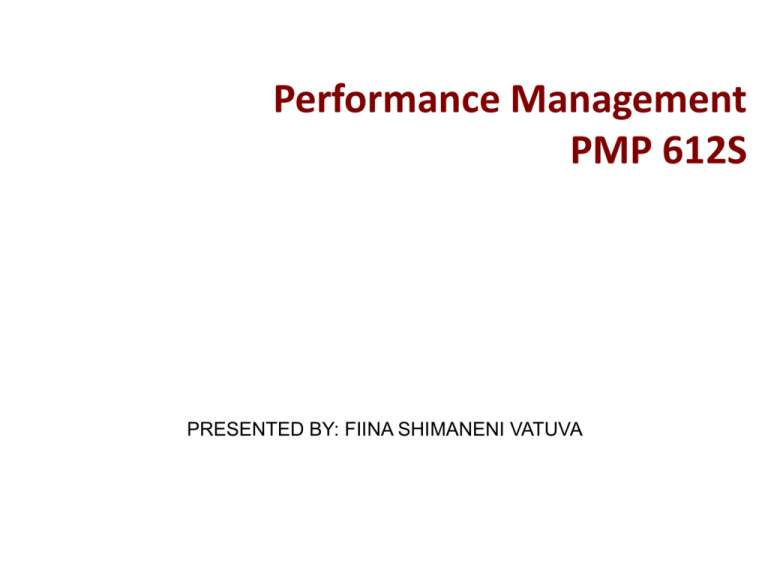
Performance Management PMP 612S PRESENTED BY: FIINA SHIMANENI VATUVA Purpose of the session The purpose of this session is to: • Identify the challenges you are experiencing in the learning process; and • The unanswered questions in the different learning units. • Summarize the main learning outcomes in each chapters Learning framework Study Unit 1: Performance Management and Reward Systems Study Unit 2: Performance Management Process Study Unit 3: Performance Management and Strategic Planning Study Unit 4: Defining Performance and choosing a Measurement Approach Study Unit 5: Measuring Results and Behaviours Study Unit 6: Gathering Performance Information Study Unit 7: Reward Systems Learning framework – Key aspects Study Unit 1 Performance Management and Reward Systems in Context • • • • • • • • Definition of Performance Management (PM) Distinguish PM from Perf Appraisal The Performance Management Contribution Disadvantages/Dangers of Poorly Implemented PM Systems Definition of Reward Systems Purposes of PM Systems Characteristics of an Ideal PM System Integration with Other Human Resources and Development Activities Learning framework – Key aspects (cont.) Study Unit 2 Performance Management Process • Prerequisites • Performance Planning • Performance Execution • Performance Assessment • Performance Review • Performance Renewal and Recontracting Learning framework – Key aspects (cont.) Study Unit 3 Performance Management & Strategic Planning • Definition and Purposes of Strategic Planning • Linking Performance Management to the Strategic Plan • Strategic Planning • Developing Strategic Plans at the Unit Level • Job Descriptions • Individual and Team Performance • Mission • Vision • Building Support Learning framework – Key aspects (cont.) Study Unit 4 Defining Performance and Choosing a Measurement Approach • Defining Performance • Determinants of Performance • Performance Dimensions • Approaches to Measuring Performance Learning framework – Key aspects (cont.) Study Unit 5 Measuring Results and Behaviours • Measuring Results • Identify accountabilities • Set objectives • Determine standards of performance • Measuring Behaviors • Identify competencies • Identify indicators • Choose measurement system Learning framework – Key aspects (cont.) Study Unit 6 Gathering Performance Information • Appraisal Forms • Characteristics of Appraisal Forms • Determining Overall Rating • Appraisal Period and Number of Meetings Learning framework – Key aspects (cont.) Study Unit 7 Reward Systems and Legal Issues • Reward Systems • Legal Issues Exam Paper Layout Two sections: • Section A: 75% Marks ranging from 3-20 Chapter 5-7 • Section B: 25% Marks ranging from 7-10 Chapter 1-4 There is at least one question taken from each of these chapters (1-4). To narrow down your reading, I have highlighted the areas (in red) which you must not concentrate on. Tips for writing an examination paper Step 1: • Step 2: Step 3: • • Step 4: • Step 5: • Read the guidelines and requirements of the examination paper before you start answering the questions. Read the question carefully. Determine what is expected of you. This implies you need to: o Identify the action verb in the questions; o Identify the topic the question is dealing with; and o Review the mark allocation for the questions. Plan your response according to the requirements and mark allocation. Ensure that you know the technical requirements of an essay, report and presentation. Read the answer/response carefully to ensure that it is correct and that you have answered it comprehensively.
